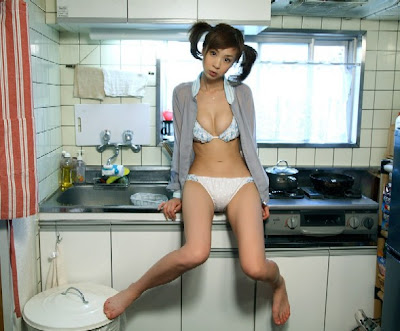In my Ship’s log for May 2010 I said that with the coming of Spring there were suddenly far too many demands on my time and energy. I made the analogy that the The Universal Dinner Lady insisted on dancing even if I didn’t feel like it. I explained about the forces of yin and yang rising and falling in their natural rhythm. My girlfriend, who is very intelligent (she will read this), seemed to misunderstand the analogy and asked me if she was being too demanding. And she is Chinese, so if she didn’t understand, maybe others didn’t.
The Universal Dinner Lady is another way of saying the Tao. In Stephen Russel’s analogy, instead of being dowdy grumpy and mean as in our school days, she is portrayed as being sexy, generous, and playful. The Tao is the source of everything in this world. We can ask for anything and she will give. But instead of demanding our dinner ticket, she demands to dance. To get what we want we have to ‘follow the Tao’. We have to put ourselves into the position to receive what it is we want. And the forces of yin and yang are a good way to understand how that can happen. I tried to explain it but I will let Stephen Russel do it better. I was actually thinking of his explanation anyway. Here it is, from his best (in my opinion) book, Barefoot Doctor’s Guide to the Tao:
The Tao gives and the Tao takes away. When it gives, you’re full; when it takes away, you’re empty again, ready to be filled with something new. Knowing this won’t change your life. The cycle of alternation between yin and yang is inexhaustible. But it may soften the blow of the ebb and flow.
Yin is empty, yang is full. Yin is soft, yang is hard, Yin comes down, yang goes up. Yin comes in, yang goes out. Yin gets cold, yang heats up. Yin gets damp, yang dries up. Yin is quiet, yang is loud. Yin retreats, yang advances. (…)
Yin and yang, like night and day, turn into their opposite number on reaching maximum potential. Thus, as the night reaches its darkest moment, the sun is already sending its first tentative rays over the horizon, and those damn birds start their tweeting… As the day reaches its brightest point, the night is already lurking, ready to cover the sky once again. When the passing police siren reaches its loudest moment, the silence is already following in its wake.
It’s the same with the energy in your body. If you go to the extremes of physical activity (yang), you exhaust yourself, and you have to rest (yin). If you stop for long enough, you grow restless and go back out again for more (yang). Obviously, if either yin or yang goes beyond that point, thereby losing its connection with the other, you die. Unchecked yin makes you congeal. Unchecked yang makes you evaporate.
Possibly the most pertinent use of this classification is in distinguishing full (yang) from empty (yin) in your relationship with the world. When your energy to go out into the world is strong, i.e. yang, and the world appears to receive you, you are considered to be full and the world empty; that is, you go and fill the world. When the world is knocking on your door and screaming at you from all directions, the world is then full and you’d better be empty!
That’s what I meant. Stephen Russel’s book is full of eye-opening insights like that which have stuck with me these last 10 years or so. I am sure I have integrated many and they have helped me probably in more ways than I realize. If this insight speaks to you, you should check him out, he is a delight to read.
Images: Aki Hoshino doing a good impersonation of the Universal Dinner Lady in full and empty mode.









No comments:
Post a Comment